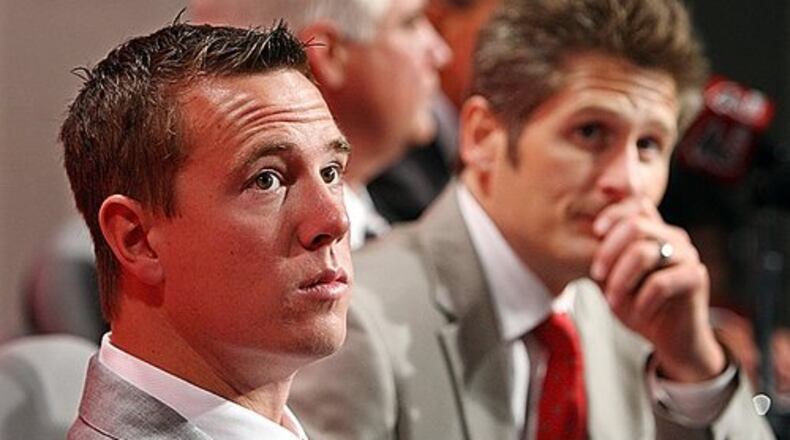After the Falcons beat the Cardinals on Sunday, coach Dan Quinn took a moment to recognize Matt Ryan and Thomas Dimitroff for becoming the sixth QB-GM duo to win 100 NFL games together.
“If I could toast you, I would say, ‘Here is to 100 more,’” Quinn said. “Good job by you two.”
It is a good job by those two (not just by those two, of course, but a big part of it). Some milestones that depend on correlation can be contrived and silly, but not this one. There's no doubt Dimitroff opened the window for a successful Falcons era when he selected Ryan with the No. 3 overall draft pick in 2008.
The Falcons had unprecedented regular-season success with those two plus coach Mike Smith and wide receiver Julio Jones. Once that era went sour, Arthur Blank hired Quinn and put him in charge of football operations. Ryan, Jones, D.Q. and T.D. took the Falcons to the Super Bowl, where you know what happened.
The Falcons were supposed to have a good shot to get back there again this season. Instead, they are finishing out Quinn’s first losing campaign in four. I don’t think the window opened by Dimitroff and Ryan has closed just yet but so many things have gone wrong that you wonder how much space is left.
Ryan’s injury luck has been amazingly good but that always can change. He’ll be 34 years old next season. How much longer can he stay healthy and play at a high level? (The rest of the offense isn’t getting any younger, either.)
The spirit that Quinn created in Flowery Branch went missing this season. It seemed to animate the Falcons during their NFC championship season. The Falcons may never recapture that feeling.
It’s hard to tell how intangible factors will go. What’s certain is that this season exposed lots of roster issues for the Falcons. Questions that seemed answered last offseason weren’t, and new ones have been piled on top of them.
It’s still not clear the Falcons have the right mix of offensive linemen (it’s not just the injuries). The defensive line has nearly as many questions. Grady Jarrett stands out, but who else? Vic Beasley is as inconsistent as ever and Takk McKinley’s second season hasn’t been as good as his first.
There’s a similar dynamic at linebacker. Deion Jones is a star. De’Vondre Campbell has been fine, I guess, but Duke Riley has not. Remember how the Falcons suddenly couldn’t cover short routes or tackle took when Jones went on injured reserve?
Those questions went unsettled and more emerged.
Are the Falcons really set with Desmond Trufant and Robert Alford as their top two cornerbacks? Are they willing to pay Beasley $12.8 million in 2019 and, if not, do they really want to invest big money and multiple years in him?
Will the Falcons part ways with benched right tackle Ryan Schraeder two seasons after signing him to an extension? Can they rely on replacement Ty Sambrailo, who flopped in Denver before the Falcons acquired him for a fifth-round draft pick last year?
There are no easy roster fixes. Realistically, the Falcons can create about $40 million in cap space but a lot should be earmarked for new deals for Julio Jones and Jarrett. Another chunk could go toward fixing the offensive line and signing tight end Austin Hooper to an extension.
The Falcons aren’t likely to have much cap money left after taking care of those priorities and others. Good luck finding an offensive lineman in the draft who would help right away. Maybe the Falcons manage to nab one of the good defensive line prospects near the top of the draft.
The Falcons will look to improve internally. That’s not an unreasonable expectation considering they’ve had so much talent on Injured Reserve.
The Falcons almost surely will be better defensively in 2019 just by getting full doses of Jones, Keanu Neal and Ricardo Allen. I’m still not convinced the injuries to guards Brandon Fusco and Andy Levitre are the root cause of the line’s collapse - neither are the Falcons based on Schraeder’s benching - but maybe I’m wrong.
Still, those injuries can make things tricky for Quinn and Dimitroff. There could be an temptation to pin too much of this season’s collapse on injuries. Publicly, Quinn has gone out of his way to dismiss injuries as an excuse but then that’s what’s he’s expected to say.
More important is that when it’s time for Quinn and Dimitroff to assess this season, they resist the human urge to blame their failures on bad luck. They’ll need to honestly evaluate the roster they’ve built. They’ll have to admit to their mistakes and, best they can, mitigate the damage those errors caused while also not overreacting to small samples.
Then there's Quinn's coaching. He must figure out which parts of his methods and messages no longer work, discard them, and come up with new elements that do work. I'm still not sure he can do it, but that's his challenge.
Quinn may have to admit that hiring a college coach to run an all-time great NFL offense set the Falcons back, and that Steve Sarkisian isn’t the one to move them forward. Quinn will have to take a more critical look at the defensive approach he honed while in Seattle and be more willing to change it up when necessary.
Everything is on the table for the Falcons. That’s how it is when a team slides from purported contenders to out of the playoffs. The Falcons have done a lot of winning since Dimitroff drafted Ryan but they’ve got a lot to fix, and fast, before that window closes.
About the Author
The Latest
Featured


